Slobodeniouk returns to BSO with dark-hued Russian program

Dima Slobodeniouk conducted the Baltimore Symphony Orchestra Saturday night in the Music Center at Strathmore.
Dima Slobodeniouk made his debut at the podium of the Baltimore Symphony Orchestra in 2013. This past fall the Russian conductor began his tenure as principal conductor of the Lahti Symphony Orchestra and artistic director of the Sibelius Festival.
Now he is back for another visit with the BSO, heard on Saturday night in the Music Center at Strathmore. Just as Russian music was the focus of his last guest appearance, when he led a noteworthy account of Shostakovich’s Eleventh Symphony, Slobodeniouk brought to life works by Stravinsky and Tchaikovsky that could hardly have provided greater musical contrast.
First the orchestra gave its belated first performance of Stravinsky’s compact, carefully constructed Symphonies of Wind Instruments (in the composer’s 1947 revision, with the parts for piccolo and alto flute removed). With confident gestures Slobodeniouk led the musicians through the thicket of multi-metric shifts. The high woodwinds coordinated their jumpy lines with crisp clarity, and the brass were solemn and cool in the closing chorale-like chords that conclude this tribute to Claude Debussy, whose death inspired this work.
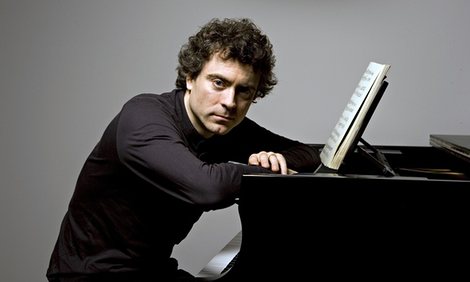
Paul Lewis
In between the Russian pieces came a dynamic performance of Beethoven’s Piano Concerto No. 4, featuring the BSO debut of Paul Lewis, the first time the Liverpool-born pianist has performed with a local orchestra. In the opening moment of reverie, Lewis took a matter-of-fact approach, as if in the midst of a scene already partly unfolded. The relaxed and pleasing tempo was still fast enough that Lewis could shine in the many runs and parallel thirds in the solo part, and Slobodeniouk kept the balance of the orchestra calibrated carefully to the soloist.
Lewis played the first, longer cadenza that Beethoven composed for this concerto, having fun with the trill that sets up a false expectation of a conclusion, only to continue in an even more virtuosic style. In the slow movement Slobodeniouk called for an ominous sound on the orchestral unison lines, clipped attacks giving them bite. Lewis played as if unaware of the orchestral menace behind him, offering pale, quiet statements. Ultimately Lewis’s playing seemed to chasten the orchestra, as if moved by the soloist to mollify their line to a more tender style.
Once the tempo of the finale crystallized between Slobodeniouk and the orchestra, the effect was thrilling, even with several of the orchestra’s principal musicians sitting out for this piece. Having dashed off the finale’s copious technical challenges with boldness and finesse, Lewis was convinced to offer an encore. Schubert’s melancholy Allegretto in C Minor, from the last year of that composer’s life, was a tragic reminder that Beethoven’s Fourth Piano Concerto was also the last Beethoven was able to perform as soloist because of his worsening hearing loss.
Slobodeniouk then put his mark on a tragic reading of Tchaikovsky’s Symphony No. 6, which opened in a web of gloom woven by the low strings and bassoon. Slobodeniouk was not interested in wallowing in the possible excesses of the first movement, not even the famous second theme, taken here with lighter rubato than usual. The trombones and other brass blazed apocalyptically on the melody Tchaikovsky drew from the Russian Orthodox funeral liturgy.
Slobodeniouk did not let moss grow under the second movement either, a lopsided waltz in 5/4 meter, often restraining the violins so that other parts could come out of the middle of the textures. In the trio the tempo stayed essentially the same, pulsating over the insistent pedal point in the timpani.
The extremely fast third movement felt precisely drilled, floating on its own airiness, a tribute to the talents of the BSO musicians. The piccolo rose out of the orchestra at climactic points, heralding the triumphal march section, played here with crisp, martial efficiency. Tchaikovsky reportedly thought of ending the symphony there, and the big conclusion drew inevitable applause, in spite of Slobodeniouk’s clear gesture that he wanted silence.
Scholar Timothy L. Jackson has called the Sixth a “tragic Eros-symphony,” reflecting Tchaikovsky’s “unmentionable” love for his nephew Vladimir (“Bob”) Davydov. Rather than a lament, the finale had the feel of an intense shriek of emotion Saturday night and Slobodeniouk brought out the tragic power in the score, driving the tempo forward through some massive crescendos.
At the end of this remarkable concert, something truly strange happened. Inattentive members of the audience began to applaud immediately after the last note of the finale, again in spite of Slobodeniouk’s hands remaining held in the air. After a few seconds, the applause died out until, in the restored silence, Slobodeniouk finally dropped his hands.
The program will be repeated 3 p.m. Sunday in Baltimore. bsomusic.org; 410-783-8000.
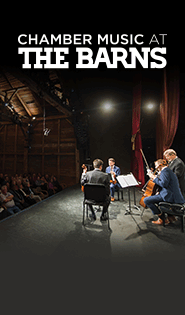
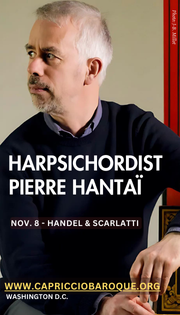

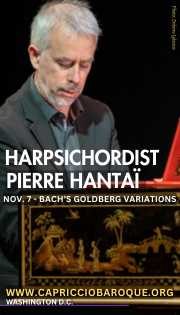
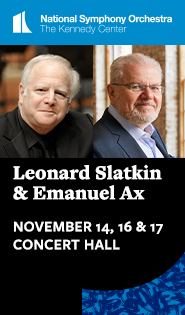


Posted Jan 12, 2017 at 6:37 am by Rebecca
Sounds wonderful. So sorry to have missed this concert.